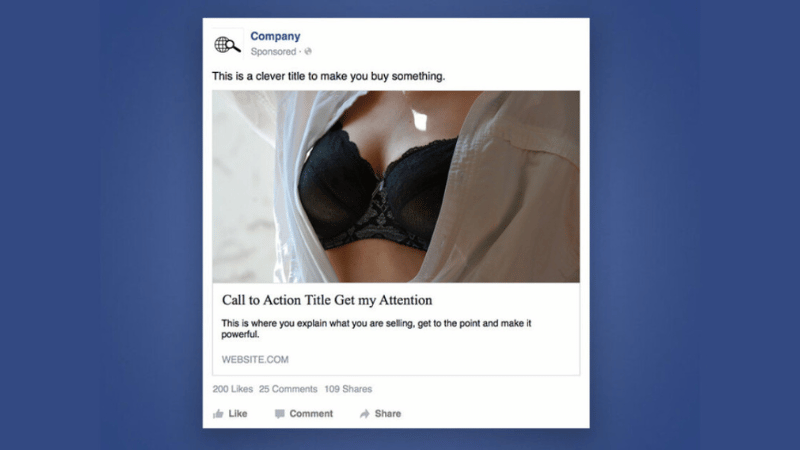When you scroll through your Facebook News Feed, you might see some content or ad creatives with sensitive content that is widely promoted in the form of livestreams or shared videos. People might think that this content would be banned by Meta, but these ads are actually quite professional because they use some obfuscation techniques.
A shocking truth has just been revealed: Facebook porn ads are rampant on the platform, hiding under the guise of harmless videos. Recently, an investigation uncovered the sophisticated methods used by scammers to disguise pornographic content using makeup tutorials, beauty livestreams, and sales videos. The issue of Facebook porn ads not only negatively affects users but also raises a big question about Meta’s moderation responsibility.
Facebook porn ads: Sophisticated disguise to circumvent the rules
The development of social media has brought countless benefits, but along with it come risky hidden corners. One of the most pressing issues today is the widespread appearance of lewd ads, which are cleverly disguised to bypass the moderation system of Facebook, now known as Meta.

The art of deception in Facebook ads
Based on an in-depth investigation by ABC NEWS Verify, these ads have transformed into beauty tutorial videos, infiltrating the news feeds of millions of users, exposing a serious loophole in Meta’s protection mechanism. What’s more, these videos are not limited to malicious content but also entice users to fraudulent websites, posing both ethical and financial risks.
Specifically, they use videos that are about 40 minutes long, with the beginning and end being normal makeup tutorials. When users scroll through their News Feed, they only see the initial images of a woman doing her makeup, with attractive headlines such as “Radiate confidence naturally” or “Change your private life today.” These headlines make users believe that the content is wholesome, related to beauty or health, and they then click to watch or let the video play automatically.
Only a few seconds after the user falls into the trap, the pornographic content automatically appears, flooding the screen. This is a deliberate tactic that takes advantage of users’ curiosity and social media browsing habits to spread malicious content. In addition, these ads also lure users to websites of unknown origin, such as the case of the VIRO site, which specializes in selling supplements for erectile dysfunction, showing a chain of fraudulent activities.
Deceiving the AI System
Not only do these malicious advertisers deceive users, but they also have extremely sophisticated tactics to bypass Meta’s automatic AI moderation system. Facebook porn ads are specially designed to “trick” the algorithm. They use the first frame of the video (thumbnail) as an image of a makeup instructor, which is completely clean content, making the AI determine that it is a legitimate ad.
Throughout the pornographic part of the video, the image of the makeup instructor is still randomly inserted, every 15 frames. This technique makes Meta’s AI system, which is trained to identify infringing images, have a hard time distinguishing between the main content and the fraudulent content. In addition, inserting a slow version of the real makeup video at the end of the ad is also a trick to prolong the wholesome content, making the AI believe that this is a complete beauty video.
Although Meta claims they have removed the infringing ads after being reported, their existence and methods of operation show serious loopholes in their automated moderation technology. This raises a big question about Meta’s ability to deal with increasingly sophisticated bad actors and new challenges in protecting users from malicious content on its platform.
What is the goal of this scam?
The scammers behind the Facebook porn ads campaigns not only aim to spread malicious content but also have deeper economic and psychological goals. According to experts, this behavior is an organized scam, taking advantage of users’ lack of vigilance to profit. It shows a sophistication in combining technology, psychology, and traditional scamming tricks in the digital space. Their ultimate goal is nothing more than to target men who are in a vulnerable state, preying on their embarrassment and shame to subtly seize their finances.
Targeting men with sensitive psychology
One of the main goals of this trick is to exploit the sensitive psychology of a specific group of people: men who are experiencing sexual health problems, especially erectile dysfunction. According to Sydney University lecturer Christopher Fox, these porn ads and fraudulent websites are designed to “prey on the embarrassment, shame, and stigma of their sexual problems.” These people often feel hesitant and do not want to share their problems with others or seek help from medical professionals. When they see ads that promise a “natural” and “easy” solution, they are easily attracted and convinced.
The use of pornographic content in ads is also a psychological tactic. When users are in an aroused state, they tend to be highly focused on sexual issues and are more likely to make poor decisions. This combination creates a perfect trap, taking advantage of psychological weakness to lure victims. This is an unethical act that exploits the suffering of others to make illegal money. The entire process from when the user views the ad to when they are tricked into buying the product is carefully calculated, creating a difficult-to-escape scam loop.
Financial fraud
In addition to psychological exploitation, the core purpose of this campaign is to commit sophisticated financial fraud. These lewd video ads all lead to a shady website, like the VIRO site, which sells a type of “supplement” that is advertised to treat erectile dysfunction. To create trust, this website uses many elaborate fraudulent tricks. First, they create an image of a “doctor” named Jonathan Meyers to increase credibility. However, according to the investigation, the photo of the “famous doctor” is just a stock photo from the internet, and there is no information about him in real life.
This website also inserts fake “certifications” and “registrations,” and even has a “sample” watermark on them. More notably, the office address of the VIRO company and the contact phone number do not exist, while the photo of the advertised product has been photoshopped from another company’s product. All of these details are intended to create a legitimate appearance, making the victim believe that they are buying a product with a clear origin and effectiveness. When the victim believes and proceeds to pay, they not only lose money for a useless product but also risk having their personal and financial information exposed to the scammers. Clearly, this is a sophisticated and organized form of financial fraud, built on a foundation of lies and deception.
How does Meta deal with this?
Although Meta has issued an official statement and removed the infringing ads after receiving reports, this incident has raised deep suspicions about the effectiveness and transparency of their system. The big question is whether Meta is really making an effort to protect users, or if it has a “double standard” policy that prioritizes profits from ad accounts over the safety of the community. The consequences of lewd ads not only affect individuals but also create an unhealthy online environment, especially for children and vulnerable people.

Facebook’s double-standard policy
Investigations by the non-profit organization AI Forensics have exposed a shocking truth: Meta seems to be applying a double-standard policy. The evidence presented is that when researchers posted similar pornographic content using personal user accounts, not ad accounts, they were quickly removed by the automated system, even before they were made public. This shows that Meta’s moderation system works very effectively when dealing with regular posts.
However, the story is completely different for commercial accounts that pay for ads. Although Meta’s policy prohibits pornographic content for both ads and regular posts, VIRO’s porn ads were approved and existed on the platform for a long time. The delay in removing this infringing content, which only happened when it was reported by independent organizations like ABC NEWS Verify, has reinforced the “double standard” accusation.
Clearly, Meta prioritizes profits from ads over consistently enforcing its own rules. This not only erodes user trust but also creates a bad precedent, encouraging scammers to take advantage of this loophole to continue their activities. The lack of transparency and inconsistency in the moderation policy has become a serious problem, threatening the safety of the entire user community on Facebook and Instagram.
Consequences of Facebook porn ads
The existence of lewd ads on Facebook and Instagram is not just a minor issue but also has serious consequences for society. First and foremost is exposure to harmful content, especially for children. Although these ads are primarily targeted at men over 45, anyone can accidentally view them through the autoplay feature on their News Feed. This causes great concern for parents and child protection organizations, as pornographic content can negatively affect the mental and physical development of adolescents.
The approval of these ads shows the weakness in Meta’s moderation, creating an opportunity for scammers to grow and spread. In one year, more than 3,316 sensitive ads were discovered in the European Union alone, and it is estimated that they reached more than 8 million users. This huge number shows the scale of the problem and Meta’s helplessness in preventing it.
The appearance of this content also creates a toxic online environment, devaluing social media platforms and causing a lack of trust from users. Regulatory bodies around the world, including cyber safety organizations, have spoken out, demanding that Meta be more responsible, establish stricter protection measures, and comply with legal regulations. Clearly, these lewd ads are not just a simple technical error but a wake-up call about the responsibility of tech giants to protect the community. If you are also experiencing a similar situation, you should immediately block this sensitive content on Facebook because it will affect your News Feed browsing.
Conclusion
Although Meta claims to have removed the infringing ads, the fact that they prioritize profits from ad accounts over the safety of the community shows a clear “double standard.” This poses a major challenge to Meta’s responsibility to create a safe and healthy online environment for everyone. We hope that the information in this article will give you insight into the issue of Facebook porn ads and how to remove them from your News Feed.
Frequently Asked Questions
These ads use very sophisticated techniques to circumvent the rules. They often disguise themselves as wholesome makeup tutorials or sales videos at the beginning, making Meta’s automated AI system identify them as legitimate content. In addition, bad actors also randomly embed “clean” images into the pornographic video to trick the algorithm, making detection extremely difficult.
The main purpose is to organize financial fraud. Scammers target the sensitive psychology of men who are experiencing sexual health problems. After luring them into the trap with pornographic content, they direct users to fraudulent websites to sell useless “supplements,” thereby stealing the victims’ money and personal information.